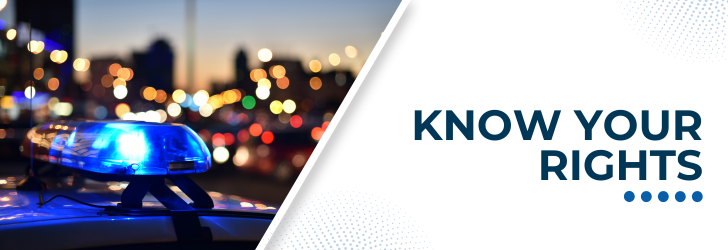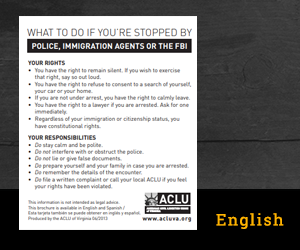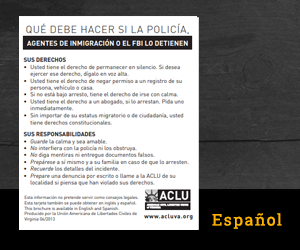
If you are stopped for questioning
- Ask if you are free to leave.
- If you are free to leave, do it calmly and quietly.
- If you are not free to leave, say "I wish to remain silent". Be aware that if you are not free to leave, the police could put you in handcuffs--this does not necessarily mean that you are under arrest.
- You can be required to give your name, ID, and other identifying information, such as your social security number. Do not lie, as lying about certain identifying information to police is a crime.
- Do not bad-mouth the police or run away, even if you believe what is happening is not right.
If you are stopped in your car
- Upon request, show them your driver's license, registration, and proof of insurance.
- If you are given a ticket, you should sign it; otherwise you can be arrested. You can always fight the case in court later.
- If the police ask for permission to search the car, say "No". However, even if you refuse, your car can be searched without a warrant in certain instances. Searches without a warrant can be challenged in court if you end up charged with a crime.
- If you are suspected of drunk driving (DWI), the police cannot force you to take any field sobriety tests, such as walking in a straight line or reciting the alphabet. Refusing to take field sobriety test cannot result in suspension of your driver's license.
If the police ask to search you or your belongings
- Say "I do not consent".
- Police may "pat-down" your clothing if they suspect a concealed (hidden) weapon. Do NOT resist, but say that you do not consent to any further search.
If the police ask if you have anything illegal
- Say "I wish to remain silent". You do not need to make any statements without a lawyer.
If you are arrested or charged with a crime
- Do not resist.
- Say "I wish to remain silent." Then, stay silent. Tell the police nothing except your name and address.
- Ask to speak to a lawyer immediately.
- If you cannot afford a lawyer, one will be appointed to you. While you are waiting for your lawyer, continue to remain silent and do not talk.
- You have the right to make a local phone call.
- Do not make any statements to family or friends while on phone calls or in visitor booths. You are being recorded.
- Do not give explanations, excuses or stories before speaking with a lawyer.
- Police can lie to you when trying to get you to make statements about a crime. Again, do NOT talk to police without a lawyer present.
When filming a police encounter
- You may legally video and audio record a police officer performing official duties while in public.
- You may not interfere with an officer performing a duty.
- Without a warrant, the police may not take your equipment or demand to view/delete footage.
- If the police attempt to take your device, do not resist. Instead, file a report.
In your home
- If the police knock and ask to enter your home, you do not have to let them in unless they have a warrant signed by a judge.
- In some emergency situations, however (like when a person is screaming for help inside, or when the police are chasing someone), officers are allowed to enter and search your home without a warrant.
- If you are arrested, the police can search you and the area close by. If you are in a building, "close by" usually means just the room you are in.
Sources:
ACLU Virginia, https://acluva.org/en/know-your-rights/know-your-rights-what-do-if-youre-stopped-police-immigration-agents-or-fbi


